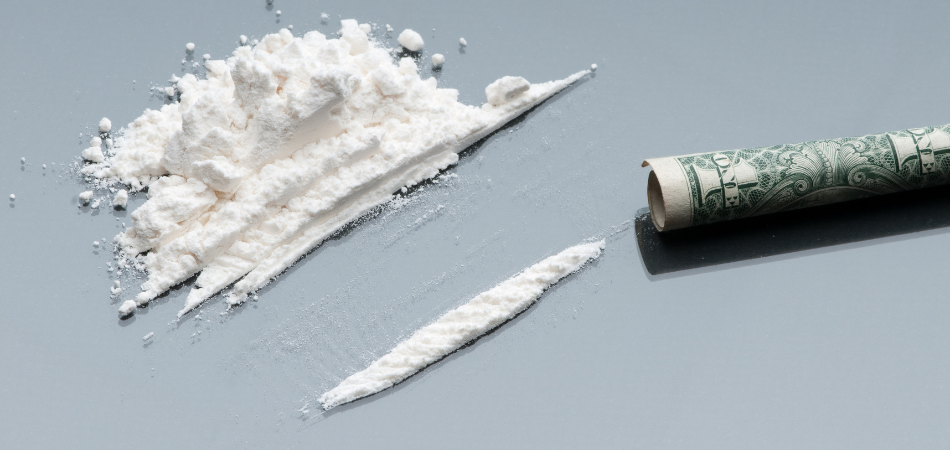This Page was last reviewed and changed on November 28th, 2023
Cocaine is a highly potent stimulant that can make people feel more energetic, alert and happy but can also cause extensive physical and mental health damage. Despite the UK consuming more cocaine than any other European country, media attention has somewhat shifted to newer substances with exciting names like Monkey Dust and The Spirit Molecule rather than plain Jane cocaine. And yet, cocaine remains the second biggest cause of drug-related deaths in the UK, with the number of fatal overdoses rising year after year.
While the media may not be focusing on this potent drug, it is worth reminding ourselves of the serious danger of cocaine overdose and its effects on the body.
What happens when you take cocaine?
When you take cocaine, either in powder form or in its crystallised “crack” form, it triggers the release of dopamine, a key neurochemical in the reward centre of the brain. It is this dopamine surge that brings on the positive, euphoric feelings that make the drug so appealing.
However, depending on the quantity of cocaine taken and other factors such as overall health, substance abuse history and mental well-being, cocaine abuse can also lead to intense highs followed by dangerous lows.
The body experiences an increased heart rate, blood pressure and temperature – all associated with increased risks of heart failure and seizures. With prolonged use, tolerance builds up quickly so users need larger amounts to experience the same effects, leading to potential addiction as well as withdrawal symptoms like depression, anxiety and paranoia when ceasing use.
Long-term cocaine users also experience appetite loss and sleep deprivation which can cause extreme weight loss and malnutrition, both of which can have serious health consequences.
What is cocaine overdose?
Cocaine overdose is a serious and potentially deadly outcome of using the drug. Although the phrase “overdose” often carries connotations of taking too much of a single substance, it is actually an umbrella term that can refer to toxicity, poisoning or simply not being able to handle the effects at levels used by others.
There are numerous ways to die from a cocaine overdose, including:
- Cardiac arrest from increased heart rate or decreased blood pressure
- Acute stroke from cerebral microvascular damage
- Arrhythmic beats
- Respiratory distress caused by seizures
- Accidents due to psychological symptoms such as paranoia and impaired judgement
- Combined drug intoxication (CDI) – caused by mixing cocaine with other drugs
In fact, if we look at the deaths of three high-profile celebrities, all of which were in part attributed to a cocaine overdose, we can see a snapshot of the myriad of potentially fatal dangers:
Whitney Houston
The legendary singer drowned in a bathtub with toxicology reports blaming high levels of cocaine intake combined with pre-existing heart disease.
River Phoenix
The iconic young actor’s death was attributed to CDI as a result of cocaine and heroin overdose having consumed high levels of both substances over the course of many days.
Chet Baker
Baker was a highly influential jazz trumpeter and vocalist who died after accidentally falling from his hotel and balcony after consuming high amounts of cocaine and heroin.
So what factors can increase the chances of a cocaine overdose?
As you can see from just these three examples, underlying health conditions and mixing cocaine with other substances can greatly increase the chances of a cocaine overdose. The latter is often hard to control because most users have absolutely no idea what they are truly buying when they are sold “cocaine” on the street.
In addition to these, other exacerbating factors include:
- Taking higher doses for a more intense high or to soothe withdrawal symptoms
- Frequent cocaine use due to cocaine addiction
- Mental health conditions which may cause a person to use excess cocaine to self-medicate
- Peer pressure to take higher doses of cocaine
- Detoxing from cocaine before relapsing which results in overdose due to reduced cocaine tolerance
How many people die from cocaine overdose every year in the UK?
If we take only the deaths directly linked to cocaine (i.e. not including accidents or suicides), the number of deaths in the UK is still frighteningly high and growing year after year. In fact, if we take the last ten years when data was available, the worrying trend is clear to see:
- 2012: 139
- 2013: 169
- 2014: 247
- 2015: 320
- 2016: 371
- 2017: 432
- 2018: 637
- 2019: 708
- 2020: 777
- 2021: 840
As you can see, drug-related deaths due to cocaine increased a staggering 700% in a single decade and this upward trend is expected to continue when the 2022 numbers are released.
What are the signs of a cocaine overdose?
With cocaine overdose such a serious issue, it’s important to spot the signs of cocaine overdose as soon as possible so medical attention can be sought right away. These include:
- Extreme anxiety or agitation
- High blood pressure
- High temperature and sweating
- Confusion
- Hallucinations
- Irregular heart rhythm
- Seizures
- Trouble breathing
Identifying these signs and taking them seriously could save someone’s life, so it’s important to stay vigilant and to notify first responders exactly what a person has taken so they can administer the right treatment straight away.
Final Thoughts
Cocaine may seem like a substance which provides unparalleled pleasure but it can also be a lethal poison. The 840 people who died from a cocaine overdose in 2021 are not just statistics, they are 840 lost futures filled with missed opportunities. Opportunities to see children grow up, marry a beloved partner and spend precious moments with family and friends. It is so important that anybody who uses cocaine understands the risk they are taking each and every time. Nobody ever expects it will be them who overdoses but the reality is, when you use cocaine, you are always playing Russian Roulette.




